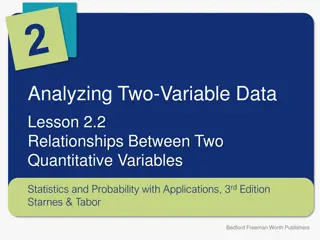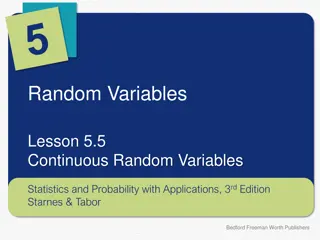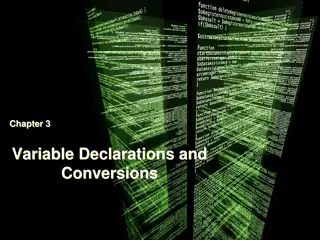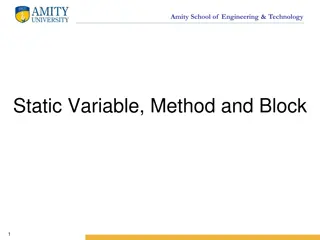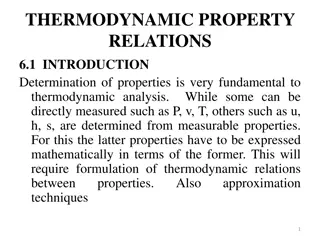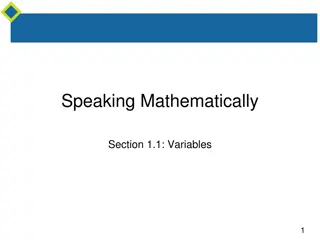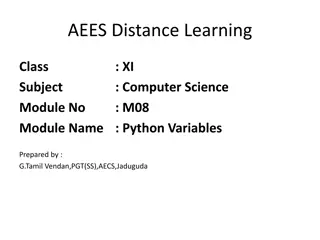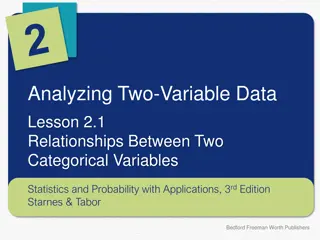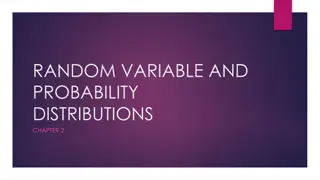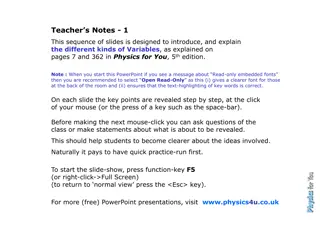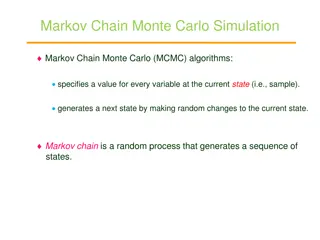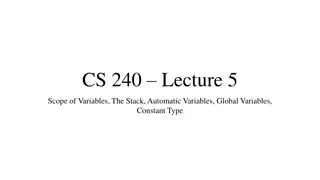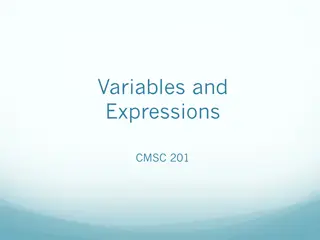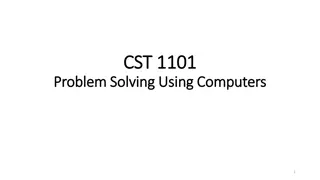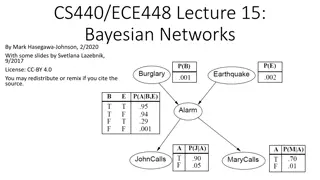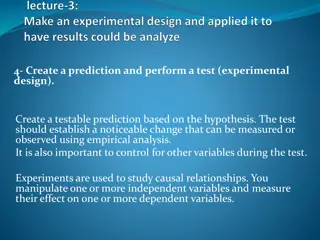Understanding Dummy Variables in Regression Analysis
Dummy variables are essential in regression analysis to quantify qualitative variables that influence the dependent variable. They represent attributes like gender, education level, or region with binary values (0 or 1). Econometricians use dummy variables as proxies for unmeasurable factors. These
3 views • 19 slides
Understanding Variables in Research Studies
Variables in research studies play crucial roles in examining relationships and drawing conclusions. They include independent variables that influence outcomes, dependent variables affected by independent ones, moderator variables that strengthen or weaken relationships, intervening variables lying
7 views • 34 slides
Constructing and Analyzing Function Tables: CC Math 6 Expressions and Equations Unit 3
This instructional material provides resources for teachers to help students understand how to represent real-world problems using variables, write equations, analyze relationships between variables, and use graphs and tables. The content covers Common Core Standards 6.EE.9, focusing on using variab
2 views • 22 slides
Understanding Variables and Control in Research Design
In research design, variables play crucial roles as either dependent or independent factors, with extraneous variables potentially affecting study outcomes. Controlling for extraneous variables is essential to attribute effects solely to the independent variables. Research hypotheses aim to test pre
0 views • 6 slides
Exploring Nonlinear Relationships in Econometrics
Discover the complexities of nonlinear relationships through polynomials, dummy variables, and interactions between continuous variables in econometrics. Delve into cost and product curves, average and marginal cost curves, and their implications in economic analysis. Understand the application of d
2 views • 34 slides
Analyzing Two-Variable Data in Statistics and Probability
This content delves into analyzing relationships between two quantitative variables in statistics and probability, focusing on distinguishing between explanatory and response variables, creating scatterplots, and interpreting the strength and form of relationships displayed. It emphasizes the import
0 views • 14 slides
Understanding Continuous Random Variables in Statistics
Learn about continuous random variables in statistics, where we analyze the probability distribution of variables to calculate probabilities, determine mean and median locations, and draw normal probability distributions. Explore examples like ITBS scores and enemy appearance in video games to under
0 views • 16 slides
Understanding Atmospheric Thermodynamics in Second Stage Lecture
Explore key concepts in atmospheric thermodynamics, including condensation level, free convection level, and the use of thermodynamic diagrams. Learn about the process of condensation, stability levels in the atmosphere, and the significance of free convection in weather patterns. Discover why therm
0 views • 27 slides
Optimization of Thermodynamic Balance Control in LEO Biosphere 2
The Landscape Evolution Observatory (LEO) within Biosphere 2 is a groundbreaking research site using advanced sensors to monitor and study water, carbon, and energy cycling in artificial landscapes. A team is working on optimizing thermodynamic control systems to maintain stable temperatures in LEO'
0 views • 12 slides
Understanding Variable Declarations and Conversions in Java
Properly declaring variables in Java is essential before using them. This chapter covers different types of variable declarations, including class variables, instance variables, local variables, and parameter variables. It also explains the concept of type casting and the importance of explicitly de
1 views • 23 slides
Understanding Static Variables and Methods in Java
Static variables in Java belong to the class rather than instances of the class and are initialized only once at the start of execution. They can be accessed directly by the class name. Similarly, static methods can access static variables directly without creating an object. This content explains t
1 views • 20 slides
Fundamentals of Thermodynamic Property Relations
Determining thermodynamic properties is crucial for analysis, involving direct and derived properties expressed through formulations and relations. Partial derivatives, fundamental relations like the 1st and 2nd laws, and functions such as enthalpy, Helmholtz, and Gibbs are explored. Maxwell relatio
2 views • 56 slides
Understanding Random Variables and Their Applications in Various Fields
Random variables play a crucial role in statistics, engineering, and business applications. They can be discrete or continuous, depending on the nature of the outcomes. Discrete random variables have countable values, while continuous random variables can take on any real number. This article explor
0 views • 6 slides
Introduction to Variables in Mathematics
Variables play a crucial role in mathematics by allowing us to represent unknown quantities and make general statements that hold true for a wide range of values. This content explains the two main uses of variables, illustrating how they help in formulating mathematical statements and solving probl
0 views • 17 slides
Thermodynamic Principles of Polymers in Solution: Flory-Huggins Theory and Macromolecular Solutions
Understanding the thermodynamic behavior of polymers in solution is crucial in various industrial and scientific applications. The Flory-Huggins theory provides insights into athermal macromolecular solutions, heat of mixtures, interaction parameters, and the concept of good vs. mediocre solvents. T
1 views • 77 slides
Understanding Heat Transfer in Thermodynamics Lecture
This thermodynamics lecture covers essential topics such as heat transfer, conduction, convection, and radiation. Dr. Jasim Al-zanganawee from Diyala University explains Thermodynamic Processes, Internal Energy, Properties of a System, and Thermodynamic Cycles. Students will learn about extensive an
0 views • 11 slides
Python Variables: Understanding Declaration, Naming Rules, and Assignment Operators
Python variables are essential for storing values in reserved memory locations. This article covers the basics of variables in Python, including declaration, assigning values, naming rules, multiple assignments, deleting variables, and assignment operators. Learn how to create, name, and manipulate
0 views • 11 slides
Understanding Variables in Educational Research
Variables in educational research play a crucial role as symbols of events, traits, or characteristics that can be measured and categorized. Different types of variables such as change, effect, and outcome variables are essential in studying causal relationships. Dependent variables represent outcom
6 views • 17 slides
Analyzing Relationships Between Categorical Variables in Statistics
Explore relationships between two categorical variables in statistics, distinguishing between explanatory and response variables. Learn to create segmented bar charts and identify associations. Understand the importance of identifying explanatory variables in analyzing data relationships. Improve yo
0 views • 15 slides
Understanding Random Variables and Probability Distributions
Random variables are variables whose values are unknown and can be discrete or continuous. Probability distributions provide the likelihood of outcomes in a random experiment. Learn how random variables are used in quantifying outcomes and differentiating from algebraic variables. Explore types of r
0 views • 13 slides
Understanding Variables, Hypothesis, and Experimental Design
Variables play a crucial role in experiments, with the independent variable being the condition that is changed, and the dependent variable being the factor affected by the change. Control variables must remain constant. Hypothesis is an educated guess that can be tested. Explore the relationship be
0 views • 13 slides
Understanding Working Fluids in Thermodynamic Systems
Working fluids are essential in thermodynamic systems to transfer energy and perform work. This article explores the selection criteria, types, and work calculation involving working fluids in cogeneration and trigeneration systems. The properties, fluid types, and work processes are discussed to un
1 views • 14 slides
Understanding Variables in Physics: A Comprehensive Guide
This presentation introduces and explains different types of variables in Physics, emphasizing the concepts of independent, dependent, and control variables. It provides practical examples and tips for identifying variables in experiments, aiming to enhance students' understanding of scientific meth
2 views • 24 slides
Understanding Essential Climate Variables (ECV) and Their Requirements
Essential Climate Variables (ECVs) are physical, chemical, or biological variables crucial for characterizing Earth's climate. They provide empirical evidence for climate understanding, prediction, risk assessment, and more. ECVs must be relevant, feasible, and cost-effective, not as stand-alone var
0 views • 14 slides
Understanding Thermodynamic Energy Balances in Solids with Jacobian Algebra
Explore the intricacies of energy balances in solids through the lens of Jacobian algebra, covering topics such as mechanics of stress and strain, Gibbs-like functions for physical properties, and third-order derivatives for thermodynamic identities. Unravel the application of Jacobians for transfor
2 views • 26 slides
Kaseya Fundamentals Workshop - Agent Procedures and Variables Overview
Discover the key aspects of Agent Procedures and Variables in Kaseya Fundamentals Workshop, including Managed Variables, Global Variables, and Public Variables. Explore examples of Agent Procedures and learn about Application Deployment, Windows Registry Modification, and more. Gain insights into Pr
0 views • 23 slides
Understanding MCMC Algorithms and Gibbs Sampling in Markov Chain Monte Carlo Simulations
Markov Chain Monte Carlo (MCMC) algorithms play a crucial role in generating sequences of states for various applications. One popular MCMC method, Gibbs Sampling, is particularly useful for Bayesian networks, allowing the random sampling of variables based on probability distributions. This process
1 views • 7 slides
Understanding Heat Transfer and Thermal Insulation
Explore the concepts of heat transfer, thermal insulation, thermodynamic systems, temperature, and means of heat transfer. Learn about conduction, convection, and radiation and how they impact the equilibrium and transfer of thermal energy. Gain insights into designing containers to minimize heat lo
0 views • 30 slides
Understanding Memory Stack and Variable Scope in Computer Architecture
This content delves into the scope of variables, the stack in memory architecture, automatic and global variables, and the concept of constant types. It explains the functioning of the stack, how function calls are managed, and the allocation of variables within stack frames. The relationship betwee
0 views • 18 slides
Understanding Variables in Programming
Variables in programming act as containers to store information. They are essential in languages like Scratch to hold values. Computers use labels to identify variables, and values stored inside can be accessed by reading the labels. Programming utilizes commands like "var" to define variables and s
0 views • 23 slides
Introduction to Variables and Expressions in Python
Today we start Python! Learn about variables, how to create them, assign values, and perform mathematical operations using variables in Python. Understand the rules for naming variables and how they are essential for storing and managing information in your programs. Explore different types of varia
0 views • 16 slides
Understanding Variables in Programming and Memory Concepts
Variables are essential in programming as they allow temporary storage of data within a program. This content delves into the concept of variables, their importance, and how they function in memory. It explains the relationship between variable names and memory locations, discusses data types, and h
0 views • 19 slides
Understanding Variables in Economics
Variables in economics, such as dependent, independent, endogenous, and exogenous variables, play a crucial role in analyzing economic phenomena. Dependent variables are influenced by changes in other variables, while independent variables are not. Endogenous variables are internal and need to be pr
0 views • 8 slides
Exploring the Relationship Between the Psychological and Thermodynamic Arrows of Time
Time, as a fundamental concept, exhibits a unidirectional flow from past to future, captured in both psychological and thermodynamic contexts. This article delves into the intriguing interplay between Newtonian dynamics and our intuitive perception of time's arrow, highlighting the challenges in rec
0 views • 28 slides
The Art of Variables in Programming and Delicious Sandwiches
Explore the concept of variables in programming using fun analogies of creating a PBJ sandwich and a s'more. Understand how variables act as containers to store important information in code. Discover the ingredients needed for each delicious treat and learn how variables play a crucial role in both
0 views • 5 slides
Thermodynamic Calculators for Comprehensive Analysis of Systems, Processes, and Cycles
Explore a series of simplification in the TESTcalc Tree, leading to the accurate analysis tool system states and basic tools for uniform and non-uniform systems. Access TESTapps for a variety of thermodynamic calculators catering to specific, generic, mixing, non-mixing, and combustion systems, alon
0 views • 12 slides
Understanding Bayesian Networks for Efficient Probabilistic Inference
Bayesian networks, also known as graphical models, provide a compact and efficient way to represent complex joint probability distributions involving hidden variables. By depicting conditional independence relationships between random variables in a graph, Bayesian networks facilitate Bayesian infer
0 views • 33 slides
Designing a Controlled Experiment: Steps and Considerations
Experimental design involves systematically testing hypotheses by manipulating independent variables and measuring their effects on dependent variables. This process includes considering variables, designing treatments, assigning subjects to groups, and planning measurements. To ensure valid conclus
0 views • 11 slides
Understanding the Fundamentals of Thermodynamics in Atmospheric Sciences
Explore the key concepts of thermodynamics in atmospheric sciences as discussed in the second stage lecture, covering topics such as extensive versus intensive variables, reversible and irreversible processes, cyclic processes, and thermodynamic variables. Gain insights into properties of systems, w
0 views • 22 slides
Understanding Global and Local Variables in Programming
Global and local variables play essential roles in programming. Global variables can be accessed by all functions within a program, while local variables are restricted to specific functions. This text explains the concepts with analogies and code examples to illustrate how variables are scoped in p
0 views • 8 slides





